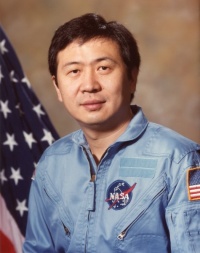Taylor G. Wang
From The Space Library
 Taylor G. Wang | |
| Birth Name | Taylor G. Wang |
|---|---|
| Birth Date | Jun 16 1940 |
| Occupation | Payload Specialist |
Contents |
Personal Data
Born June 16, 1940, in Mainland China. He is a Physicist at the Jet Propulsion Laboratory in California, and is a U.S. citizen. He is married, and has two sons.
Education
Received a bachelor of science degree in physics in 1967, a master of science degree in physics in 1968, and a doctorate in physics in 1971, from the University of California at Los Angeles.
Experience
After completing his doctorate, Dr. Wang joined the California Institute of Technology Jet propulsion Laboratory (JPL) in 1972, as a senior scientist. He is currently Program Manager for Materials Processing in Space. At JPL he was responsible for the inception and development of containerless processing science and technology research. He is the Principal Investigator (PI) on the Spacelab 3 mission NASA Drop Dynamics (DDM) experiments, PI on the NASA SPAR Flight Experiment #77-18 "Dynamics of Liquid Bubble," PI on the NASA SPAR Flight Experiment #76-20 "Containerless Processing Technology," and PI on the Department of Energy Experiment "Spherical Shell Technology." Dr. Wang has been conducting precursor drop dynamics experiments for the DDM in ground-based laboratories employing acoustic levitation systems, neutral buoyancy systems and drop towers, and in the near weightless environment provided by JSC's KC-135 airplane flights and SPAR rockets. These flights have helped to define the experimental parameters and procedures in the DDM experiments to be performed on Spacelab 3. He is the inventor of the acoustic levitation and manipulation chamber for the DDM and is the author of 70 articles in open literature and 20 U.S. patents.
Spaceflight Experience
NASA EXPERIENCE: Dr. Wang flew on STS-51B Challenger (April 29-May 6, 1985). STS-51B/Spacelab-3 was launched from Kennedy Space Center, Florida, and returned to land at Edwards Air Force Base, California. It was the first operational Spacelab mission. The seven-man crew aboard Challenger conducted investigations in crystal growth, drop dynamics leading to containerless material processing, atmospheric trace gas spectroscopy, solar and planetary atmospheric simulation, cosmic rays, laboratory animals and human medical monitoring. At mission conclusion, Dr. Wang had traveled over 2.9 million miles in 110 Earth orbits, and had logged over 168 hours in space.
Special Honours
Other Information
May-85
